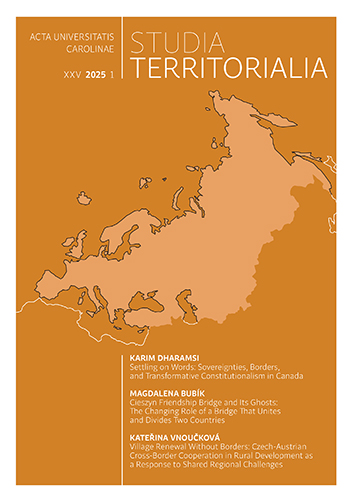AUC Studia Territorialia (Acta Universitatis Carolinae Studia Territorialia) is a peer-reviewed academic journal focusing on Area Studies. It covers political, economic, social, and cultural affairs of North America, Europe, and post-Soviet Eurasia in the twentieth and twenty-first centuries. The journal was founded in 2001; currently, it appears biannually, both electronically and in print. It publishes original scholarly articles, book reviews, conference reports and research notes. The journal is a publication of the Institute of International Studies at Charles University’s Faculty of Social Sciences.
AUC STUDIA TERRITORIALIA, Vol 17 No 1 (2017), 35–60
International Organizations in the Cold War: The Circulation of Experts Beyond the East-West Divide
Michel Christian, Sandrine Kott, Ondřej Matějka
DOI: https://doi.org/10.14712/23363231.2017.17
published online: 04. 01. 2018
abstract
This article aims to explain the existence and longevity of East-West contacts across the Iron Curtain between groups of actors in various international organizations. Three particular organizations, the International Labour Organization (ILO), the UN Conference on Trade and Development (UNCTAD), and the World Council of Churches (WCC), were chosen, all of which were involved in social, economic, and cultural issues. The official discourses of the era were clearly built in opposition to each other on each side of the Iron Curtain. This study allows us to understand the necessary conditions for the constitution of the groups of experts in the organizations who succeeded in working together, while still acknowledging their ideological differences. A focus on individual and collective actors and their career trajectories enables us to examine a hypothesis that specific “epistemic communities” gradually formed, based on convergent conceptions of moder- nity. In order to emphasize the global aspects of this process, our analysis pays attention to the North-South dimension as well as the East-West contacts. It examines the roles and perceptions ofrecently decolonized countries inside the chosen international organizations in order to identify another element contributing to the organizations’ stability.
keywords: transnational history; international organizations; Cold War; epistemic communities
148 x 210 mm
periodicity: 2 x per year
print price: 180 czk
ISSN: 1213-4449
E-ISSN: 2336-3231
